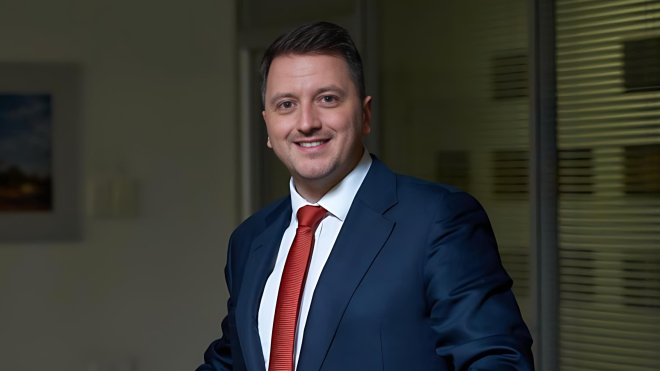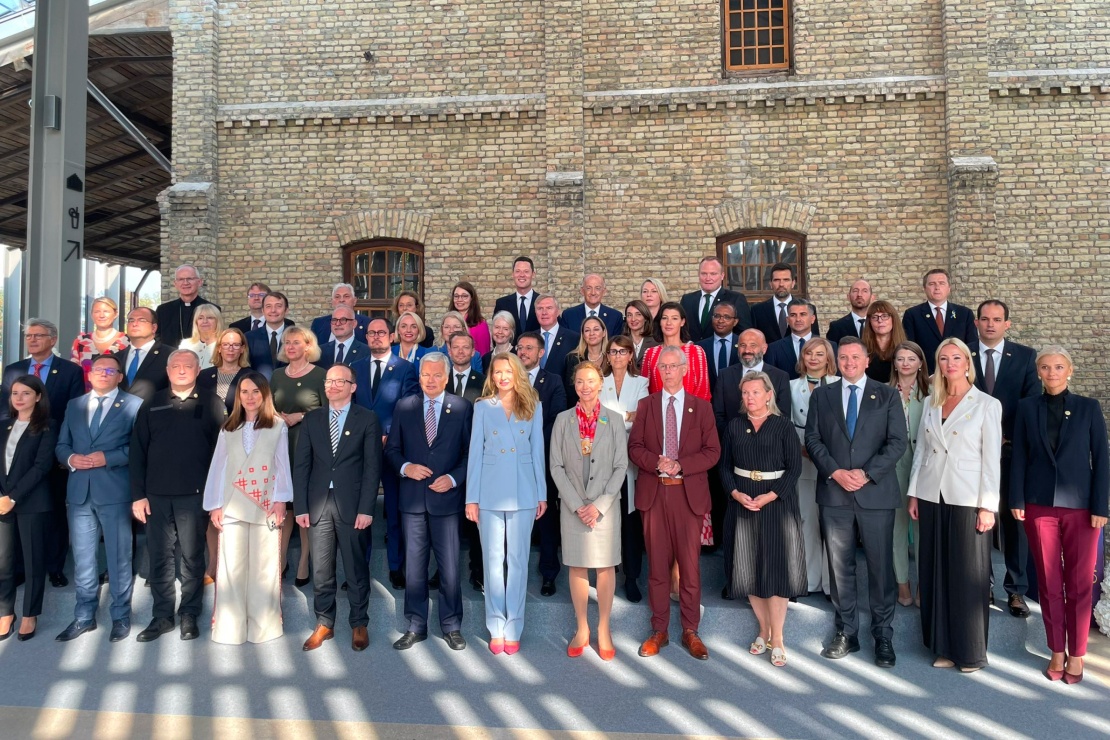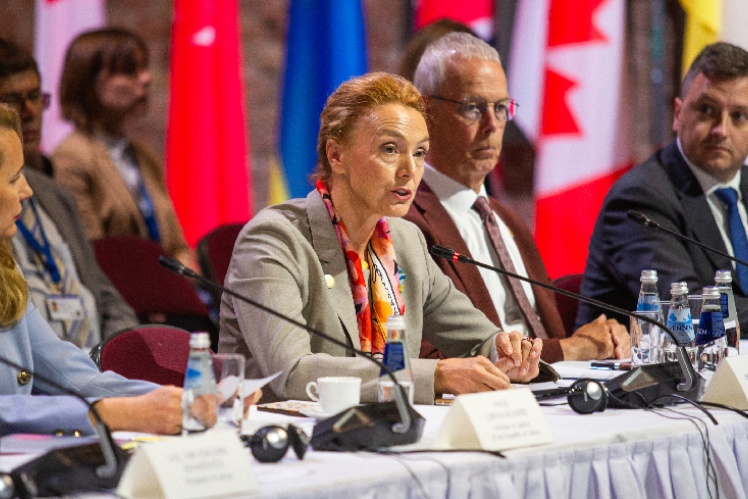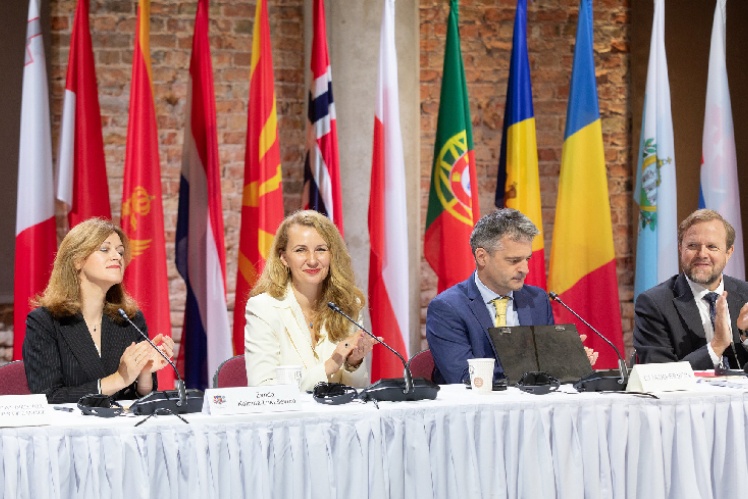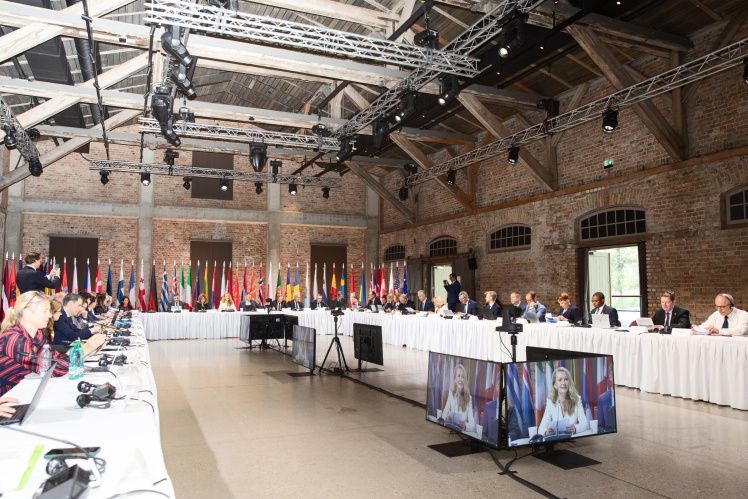What is the Register of Damage Caused by the Aggression of the Russian Federation against Ukraine, why is it needed, and what is its task?
Russian aggression causes enormous damage to Ukraine every day. Such a register is a way to keep track of it, to understand to whom exactly it was inflicted, in what amount and by what. And most importantly, what is the evidence for this. The main purpose of the register is for Russia to pay reparations to Ukraine for all this damage. Therefore, the register can be perceived, first of all, as a database that accumulates, organizes, systematizes, and classifies this information. But this is also the first component of the general international compensation mechanism, which should ensure reparations in the future.
I came to you after hearings at the UN International Court of Justice regarding our lawsuit against Russia. If the UN International Court of Justice examines our lawsuit on the merits, will it take the figure for reparations from you?
Not quite so. The International Court of Justice of the United Nations is considering the case regarding Russiaʼs violation of the Convention on Genocide, and it is quite narrow. The big question is how it correlates with a wide range of reparations for all the damage done to Ukraine. The reparation process stands somewhat aside.
There is a rule in international law that the state that violated it must pay reparations. All that is needed is a mechanism to implement it. There are usually two ways: either with the consent of all parties, or through a decision of the UN Security Council. Both the first and the second will not happen in the near future, because it is about Russia. Therefore, the mechanism must be invented from scratch.
Ukraine proposed a mechanism consisting of three components. The first is the register of losses. It must collect all information and evidence. Then there will be a compensation commission, which will consider the evidence on the merits and decide on the amount of damages. And the third component is the compensation fund, from where these payments will be made. They have no relation to the UN International Court of Justice. But if the court sides with Ukraine, it will, of course, help.
So you wonʼt mix that before?
These are parallel processes. For example, as one of the reasons for our work, we point out that Russia does not fulfill the security measures of the UN International Court of Justice.
And why is the register international, and why is it physically located in The Hague? It is easier to fix losses for Ukraine on the spot.
It is international because everything we do is based on international law. As we have to tread our way, it is important to us that this process is international, impartial, objective and widely supported. That is why we work under the umbrella of the Council of Europe. We have 44 members: 43 countries and the European Union, but we hope that there will be more countries. We actively invite non-European countries to join us, because this is a global project, not a regional one.
All information really comes from Ukraine. But everything that happens to it later, for example, verification, already follows international rules that the 44 participants of the registry have agreed among themselves and approved.
Conference of Ministers of Justice of the Council of Europe member states, Riga, Latvia, September 11, 2023.
X (Twitter) / «Бабель»
Why The Hague? This is symbolic: The Hague is the world capital of international law and justice. The International Court of the United Nations, the International Court of Justice, Eurojust, and many other international organizations working in the field of law and justice are nearby. In addition, we received huge support from the government of the Netherlands — it offered to take over the register, helps us organizationally and materially. We rely on digital technology, and it is available here. And almost the most important — The Hague attracts international lawyers. And we want to have a highly professional staff.
What is the registerʼs budget?
We have not announced the numbers anywhere, and I will allow myself to keep them to myself for now. We are not building a large organization. We will have about 45 people on staff. We will rely on digital technologies, software, even artificial intelligence to process, systematize, categorize millions of claims.
Anton Korynevych said that there is still no final compensation mechanism. What is it about, what exactly is the problem, what are the obstacles?
I said at the beginning of the conversation about three components — the register, the compensation commission and the compensation fund. Here we are talking about the second and third components of this registry. The registry was created extremely quickly: according to the standards of international law, it is just the third cosmic speed. Now we have already started talking about the second and third stages. The peculiarity is that no one has ever done it that way, because according to international law, obligations can be placed on a third state only with its consent.
There is a political aspect. Because certain countries are afraid that this will create a dangerous precedent that unscrupulous states can use for their own purposes in the future. Therefore, we need to seek consensus.
Our position is that this mechanism will not impose any new obligations on Russia, because it already has an obligation to pay reparations for the damage caused by its aggression.
But legally, Russia has not yet been recognized as an aggressor.
The resolution of the UN General Assembly on March 2, 2022 condemned Russia for an act of aggression and violation of Article 2 of the UN Charter. What else is needed? In our opinion, nothing more.
On September 11, 2023, a conference of justice ministers of Council of Europe member states was held in Riga. It is clear from the speeches at this conference that most of the members of the Council of Europe are ready for the second and third stages, the compensation mechanism. You just need to find the formula. Therefore, I am optimistic.
The second conference of the participating countries of the Register of Damage Caused by the Aggression of the Russian Federation against Ukraine, September 12, 2023.
X (Twitter) / «Бабель»; Getty Images / «Babel'»
The representative of the British government, Leo Docherty, said at the YES forum that Britain can legally freeze Russian assets, but cannot confiscate them. How should compensation then take place?
We do not believe that states cannot confiscate Russian assets. Letʼs take a step back. We may be talking about assets that belong specifically to the Russian Federation, as a subject — sovereign assets. And assets that belong to someone else with Russian roots — oligarchs, state companies, anyone.
In the context of reparations, we are primarily talking about sovereign assets. Most often, these are assets or reserves of the Central Bank and assets of the Russian Direct Investment Fund.
That is, money in banks on accounts?
In banks, in various financial institutions. The lionʼs share of Russian assets is, surprisingly, in Belgium in the Euroclear system, through which investment operations in various securities are carried out. There, according to various estimates, from $180 to $220 billion. No one yet knows the total amount of Russian assets around the world, but it is somewhere from $300 to $350 billion.
While we are building the system, things may change. For example, Russia will want to cooperate with this system, unfreeze its funds, gain access to financial markets. Then there are different options. Russia can finance the compensation fund directly. Or you can take the cheat sheet when Iraq was forced to pay reparations to Kuwait. Then it directed there 35% of its income from oil exports to reparations. But so far, such instruments are quite abstract, because Russia is not capable of negotiating.
So confiscations are not the only way?
Plan A now is confiscation. We believe that states can legally confiscate Russian assets. What is the difficulty? The fact that no one has done this before. Because since the appearance of the UN Charter as a fundamental source of international law, there have been no such situations. But Russia violated the fundamental principles of the UN Charter, committed an act of aggression. Therefore, all states must react to it. There are legal grounds [for confiscation].
The only question is how to overcome the sovereign immunity that protects Russian assets. And here we are looking for a consensus. We believe that a state that grossly violates one provision of international law cannot hide behind an adjacent provision to avoid the consequences. It is wrong!
But we donʼt say "take all 350 billion Russian assets and give them to Ukraine." We record the damage caused by Russiaʼs actions, calculate how much money and to whom the aggressor owes. Of course, this process requires a certain political courage. But thatʼs all there is to it.
You mentioned the precedent with Iraq and Kuwait. Is it even possible to apply the experience of such precedents to our situation?
The decision of the Security Council was only in the case of Iraq and Kuwait. In all other cases, the parties agreed, either as part of a peaceful settlement of the conflict, or as a separate agreement. Cases between Congo and Uganda were referred to the UN International Court of Justice, which resolved the issue of reparations.
We are interested in the example of Iraq, namely the mechanism of the UN compensation commission — this is the most suitable example for analogy, when one state openly committed aggression against another, and accordingly the consequences of this aggression for individuals, companies, the state, for the environment and cultural heritage had to be somehow address. This UN compensation commission worked for 31 years. It finished its work a week before Russiaʼs full-scale invasion of Ukraine. They developed a rather powerful algorithm there. We have technological advantages compared to the 1990s, so we can be faster, but we also have higher volumes [of what is to be compensated for].
After the invasion of Kuwait, the UN Security Council passed a resolution calling for a financial and military boycott of Iraq.
Getty Images / «Babel'»
And at what point did Iraq agree to cooperate?
At the very beginning. Third powers, led by the United States, entered that war based on a UN Security Council resolution. A big leverage was that Iraq had no other income except oil exports. And it was actually forced to hand over 35% of its oil income to the compensation fund. This became possible thanks to the pressure of the UN Security Council.
The beginning of the 1990s is considered the period of greatest cooperation in the UN Security Council: the Cold War ended, everyone was on the same side. We donʼt have that. Therefore, instead of the Security Council, we have the resolution of the UN General Assembly dated November 14 last year. There are three important points: the recommendation to create a register, the indication that Russia should be held accountable through the payment of reparations. And the need to create a compensation mechanism.
Can individuals and legal entities submit information to the register? Can my neighbor, whose house was destroyed by a missile fragment, also submit information to your registry?
Yes. Information can be submitted to the register by individuals, legal entities and the state, in the broadest sense of the word: state enterprises, municipal and state bodies. That is, everyone who suffered losses.
People can submit information about damage to "Diia" and to local authorities, now this register. It turns out that there will be three appeals for one damage. How to unify it?
These are different processes that are formally unrelated. We understand what is being done at the local and state levels through the Register of Damaged and Destroyed Property (RDDP).
It is wrong to call what the state is doing through the RDDP the word "compensation", because Ukraine has not done anything bad to these people. Rather, the state provides a helping hand. And the size of this compensation is quite limited. And then the state will enter them into our register.
That is, instead of my neighbor, if he receives money through RDDP, the state will submit an application to your registry?
Yes. But if your neighborʼs damages are greater than the amount that Ukraine will pay him, then he has every right to apply for the rest. We want to make sure that information between all registries and databases can flow into our registry. That is, a person submits an application, and an extract of ownership rights from the register of rights to real estate, information from the demographic register that identifies the person is gathered. And if a person has already submitted some evidence, then they should also be automatically pulled up. A person should not do the same thing twice or thrice. It wonʼt work in all cases, but you have to try.
I donʼt worry about big businesses, big companies — they will handle the complicated legal process. I worry about people, about your neighbor, who will apply from the phone or from a computer. Changes to the legislation are needed.
What kind of evidence should the injured person provide?
I cannot say yet, because these requirements must be approved by the Registry Council, which does not yet exist. Currently, the participating states nominate candidates, and in mid-November there will be a vote. The council will consist of seven members, one of them nominated by Ukraine, the other six — by all members of the registry. This council should define the categories of damages, formulate requirements for evidence. Because the requirements in the categories "forced resettlement" and "destruction of property" are completely different, they cannot be compared. There will probably be abuse attempts, imperfect applications, so we need to have clear parameters. And the main requirement is that everything will be exclusively digital.
Who will calculate the damages, and what is the calculation methodology?
Calculating damages is not part of the registryʼs mandate. This is the second element of the mechanism, and this will be done by the compensation commission, which will review the applications, claims on the merits and give them an assessment.
That is, you collect, analyze whether all the necessary documents are in place, whether there are no duplicates, and transfer it to the commission?
Basically, yes. We have three check boxes that need to be ticked to register an application. This must be damage on the territory of Ukraine, in the period from February 24, 2022 and in connection with Russian aggression.
Signing of the agreement on the Register of Damage Caused by the Aggression of the Russian Federation against Ukraine, May 17, 2023.
X (Twitter) / «Бабель»
These are quite broad criteria. The registry does nothing more than group applications and prepare them for consideration. We have not yet decided whether we will require the plaintiffs to submit some kind of estimate, or even to name a figure they would prefer to receive. Perhaps it will be in certain categories, but not in all. I wouldnʼt want to get ahead of myself.
When will people physically be able to send you applications?
We are targeting the first quarter of 2024. Most likely, not for all categories at once.
And what are the categories anyway? Do you divide into "legal entity", "individual", "state"? Or by categories of damage?
Both ways. There is a division by submission subjects. You have correctly described persons, legal entities and the state. And also there is differentiation by type of damage or offense: starting from forced displacement or resettlement.
And what about moral damage?
Itʼs included too. It is clear that at some point the line will have to be drawn. But all the harm that can be felt, all the things that people were forced to do and whatever they wouldnʼt do in normal life (forced displacement, forced departure, deportations), everything related to war crimes (murders, torture, sexual violence, forced labor), loss of life or health, losses related to education. Next, we move on to property damage. Then, humanitarian damage — damage related to the demining of territories. Ecological one. Damage caused to historical and cultural heritage.
And does it apply to the military?
We believe that all this should apply to the military. I say cautiously, because 44 participants must sign for it.
That is, there can be a dispute on international humanitarian law?
According to the Geneva Conventions, military personnel of the Ukrainian Armed Forces are combatants. They are somewhere more protected, but their function is to fight. But in the UAF there are a lot of mobilized people, not professional soldiers. Without the war, they would not have gone to the front and would not have died. That is why, in our opinion, they are victims of Russian aggression.
In any case, their families suffer.
Absolutely. And then difficult questions begin: is it possible to compensate for losses at the macro level — to sectors of the economy as a whole? Can the fall in GDP somehow be compensated? An interesting case is the consequences of blowing up the Kakhovka HPP. The direct consequences are clear. The consequences of the loss of irrigation for entire agricultural sectors are also enormous. How to evaluate this in the context of a specific enterprise, a specific agricultural firm, which could grow something on its land, but now cannot? How to assess the fact that the countryʼs exports have fallen? And this means that the foreign exchange revenue of the country has also decreased. So layering begins. And there is no answer here yet.
Flooding after the explosion of the Kakhovka HPP dam.
Getty Images / «Babel'»
Not only Ukraine suffers from Russian aggression. There are African countries that currently do not receive Ukrainian grain. There are destroyed foreign ships that were in our ports. There are debris of missiles falling in neighboring countries. There are environmental problems that spread throughout the Black Sea. Can other countries apply for reimbursement?
As I said before, you have to draw the line somewhere. We conduct this process inside the borders of Ukraine. Other countries have to solve this issue themselves.
That is, it is possible to submit an application for a damaged vessel on our territory?
If it was in a Ukrainian port, then I assume that yes. Because there is no nationality or citizenship of the plaintiff among the criteria. If he/she was a citizen of another country who had property here, he or she cannot be deprived of this right. Or foreign investors who had businesses here and suffered losses.
And the last question. Is there an understanding of when people will be able to receive compensation?
I would be lying if I said that there is such an understanding. We still have a long way to go.
Translated from Ukrainian by Anton Semyzhenko.
We also record the damage that Russia is doing to Ukraine, so that later it will pay the bills. Support Babel: 🔸 in hryvnia, 🔸 in cryptocurrency, 🔸 Patreon, 🔸 PayPal: [email protected]
